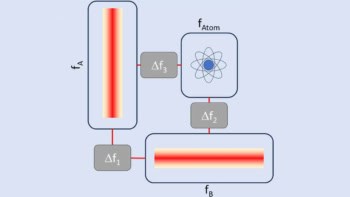Bosses at the Perimeter Institute for Theoretical Physics in Waterloo, Ontario, are looking for a new leader following the sudden departure of executive director Howard Burton. The 42-year-old theoretical physicist, who has led the institute since it was founded in 1999, is leaving today after negotiations over a new contract broke down. Departing six weeks before his contract officially runs out, Burton plans to take a year off from science in the south of France.

The Perimeter Institute was founded by Mike Lazaridis, chief executive of Research in Motion — the company that makes Blackberry wireless handheld devices. He hired Burton, who has a PhD from the University of Waterloo, to turn the institute into a world-class centre for the study of fundamental questions in areas such as cosmology, particle physics and quantum gravity. It is now home to more than 60 resident researchers.
However, Burton refuses to explain exactly why he left, citing only certain “difficulties that had lasted awhile, many [of which] were not directly related to the goals of the institute”. But he admits to being disappointed at having to leave so suddenly. “The normal practice is to give notice and have a search for the better part of a year before moving on,” he told Physics World.
John Matlock, a spokesman for the institute, admits that Burton’s departure may have surprised some people. However, he adds that “for many of us it was pretty clear that Howard would not be remaining at the Perimeter Institute for ever. He has a lot of passions and interests and a lot of great ideas.” Institute bosses have already started asking faculty members who they think should replace Burton. The search will also involve the institute’s scientific advisory committee as well as its board of directors.
Whoever replaces Burton will find an institute in good shape. It recently received sufficient funding from the Canadian government to keep going for the next five years, while the National Sciences and Engineering Research Council reviewed its work favourably, concluding that the institute “has been a great success on a world-wide scientific scale for Canadian science”. The institute also attracts many physicists from around the world and has a strong public-outreach programme.
“Burton has developed an efficient administration that makes all this activity possible,” says Princeton University cosmologist Paul Steinhardt, who chairs Perimeter’s science advisory committee. “To some degree he’s really been scientific director, educational director, and outreach director, as well as executive director.”
There is also praise from Anthony Leggett, the Nobel-prize winning physicist from the University of Illinois, who is a member of Perimeter’s scientific advisory committee. “Burton has turned the Perimeter Institute into an institution that’s practically unique in the world, particularly in its emphasis on the more speculative aspects of theoretical physics,” he says. “It’s one of the few places where quantum foundations is a strong field.”
Burton, whose interests in literature, music, theatre, philosophy and sports make him something of a Renaissance man, now plans to take a year off in the south of France. “I’ve done a reasonable amount of writing and I hope to continue. I’m finishing a book about the institute and I have a few other projects,” he says.



